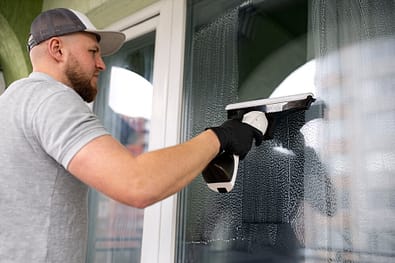
In this article, we delve into the root causes of hard water stains, explore effective prevention strategies, and tackle all your questions regarding the best methods for window cleaning to get your windows sparkling again.
Article Summary:
- What Causes Hard Water Stains?
- The Impact of Hard Water Stains on Windows
- Effective Methods for Preventing Hard Water Stains
- How to Choose the Best Window Cleaning Service
- Why Professional Window Cleaning Is Essential
- Trust TruShine Window Cleaning for Your Hard Water Stains
- Frequently Asked Questions
1. What Causes Hard Water Stains?
Hard water stains are caused by the presence of high levels of minerals, such as calcium and magnesium, in your water supply. These minerals can leave behind a residue when the water evaporates, resulting in unsightly stains on surfaces like sinks, tubs, toilets and you guessed it, windows.
2. The Impact of Hard Water Stains on Windows
In addition to being a nuisance in your bathroom and kitchen, hard water stains can also affect the appearance of your windows. Over time, these mineral deposits can build up on the glass and create a cloudy or hazy film that is difficult to remove. This not only affects the aesthetics of your business or home, but it can also decrease the amount of natural light that enters your space.
3. Effective Methods for Preventing Hard Water Stains
The best way to deal with hard water stains is to prevent them from forming in the first place. Here are a few effective methods for preventing these stubborn mineral deposits:
- Install a water softener: A water softener can help remove excess minerals from your water supply, reducing the likelihood of hard water stains.
- Use distilled white vinegar: Regularly wiping down surfaces with a solution of equal parts water and white vinegar can help prevent mineral buildup. This is not only effective but an eco-friendly window cleaning solution.
- Dry surfaces after use: After using sinks, tubs, and showers, be sure to dry them with a towel or squeegee to prevent water from evaporating and leaving behind mineral deposits.
4. How to Choose the Best Window Cleaning Service
If you are looking for a reliable professional window cleaning service, here are a few factors to consider:
- Experience: Look for a company with years of experience in the industry. This will ensure that they have the necessary skills and knowledge to effectively remove hard water stains.
- Reputation: Read reviews or ask for recommendations from friends and family to find a reputable window cleaning service.
- Services offered: Check to see if the company offers additional services such as gutter cleaning or pressure washing, as this may be convenient for you in the future.
- Pricing: While cost shouldn’t be the only factor when choosing a window cleaning service, it is important to find one that fits within your budget. Get quotes from multiple companies to compare prices.
5. Why Professional Window Cleaning Is Essential
While there are DIY methods for removing hard water stains from windows, it is often best to leave this task to a professional. Professional window cleaners have the tools and expertise to effectively remove stubborn hard water stains without damaging your windows. They also have access to specialized cleaning solutions that can help prevent future buildup.
6. Trust TruShine Window Cleaning for Your Hard Water Stains
At TruShine Window Cleaning, we have years of experience in effectively removing hard water stains from windows and other surfaces. Our team of professionals uses top-of-the-line equipment and cleaning solutions to ensure a streak-free shine every time. Contact us today for a free quote for Houston window cleaning.
7. Frequently Asked Questions
 1. What are hard water stains?
1. What are hard water stains?
Hard water stains are caused by mineral deposits, primarily calcium and magnesium, left behind when water evaporates. They often appear as cloudy spots or streaks on surfaces like glass, tiles, and fixtures.
2. How do hard water stains form?
These stains form when hard water containing dissolved minerals dries on a surface, leaving behind a residue. Common sources include tap water, sprinkler systems, and showers.
3. Are hard water stains harmful to surfaces?
Over time, hard water stains can etch into glass and other materials, causing permanent damage if not removed promptly. They can also reduce the transparency and aesthetic appeal of windows and other glazed surfaces.
4. Can I prevent hard water stains?
Yes, prevention methods include using water softeners, applying protective coatings to vulnerable surfaces, and regularly cleaning with appropriate solutions to remove mineral buildup before it can cause stains.
5. How can I remove hard water stains from windows?
Professional window cleaning services like TruShine Window Cleaning use specialized products and techniques to safely and effectively remove hard water stains. For DIY methods, mixing vinegar with water can help dissolve mineral deposits.
6. Do professional window cleaners charge extra for removing hard water stains?
Many professional window cleaners may charge an additional fee for removing significant hard water stains due to the extra time and specialized products required.
7. How often should I clean my windows to prevent hard water stains?
Regular cleaning, ideally monthly, can help prevent the buildup of hard water stains. Consistent maintenance reduces the likelihood of severe staining and extends the life of your windows.
8. Are there long-term solutions to combat hard water issues?
Installing a water softener can significantly reduce the hardness of your water, thereby preventing stains. Additionally, applying water-repellent treatments to surfaces can create a barrier against mineral deposits.
9. What happens if I leave hard water stains untreated?
If left untreated, hard water stains can become more difficult to remove and may cause permanent damage, especially to glass surfaces. This could lead to costly repairs or replacements.


 1. What are hard water stains?
1. What are hard water stains?